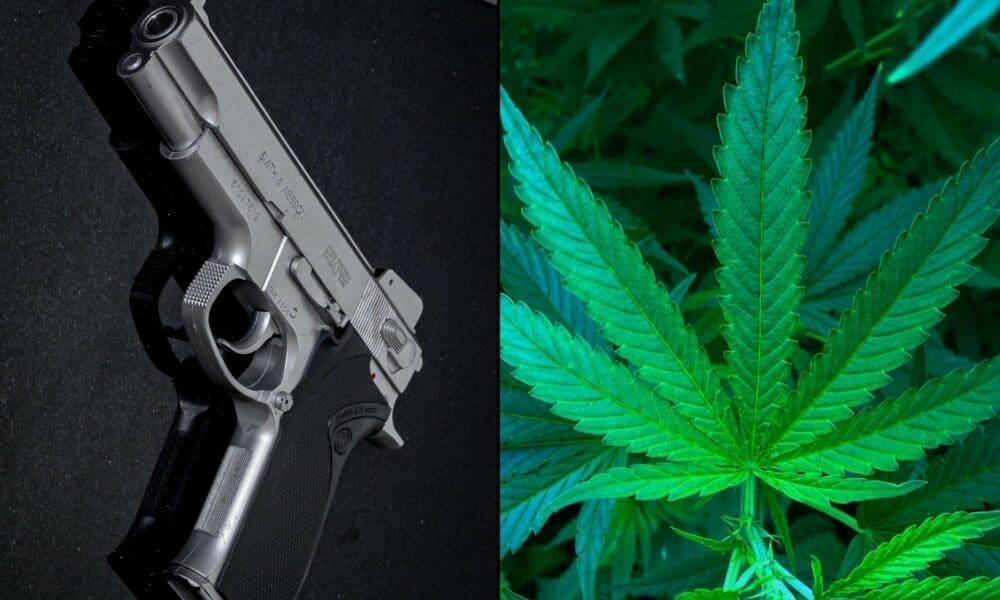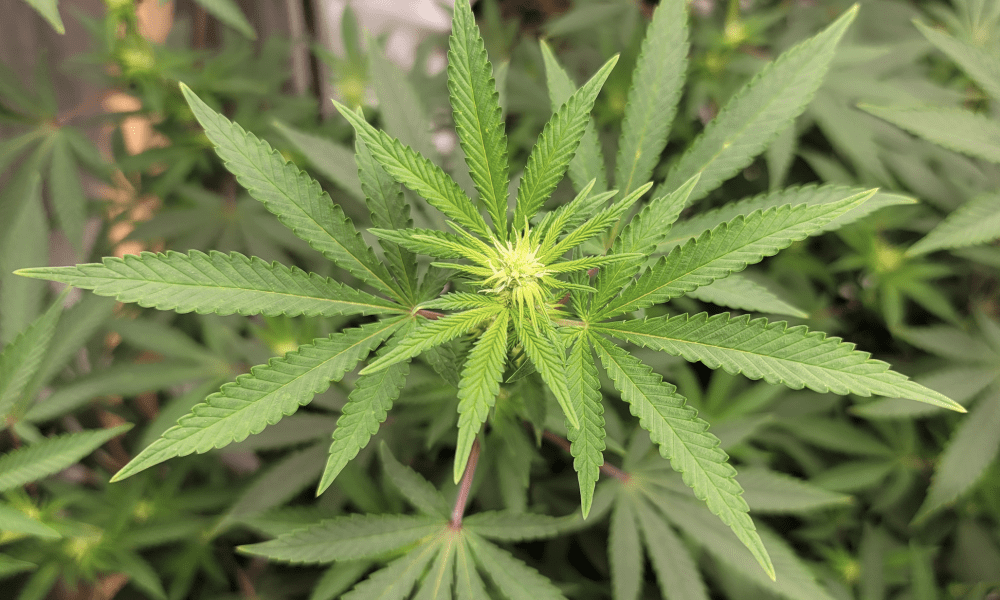featured
Letting Marijuana Users Have Guns Poses ‘A Clear Danger,’ Trump’s Solicitor General Tells Supreme Court
Published
13 hours agoon

In a recent filing with the U.S. Supreme Court, the Trump-led Department of Justice (DOJ) is doubling down on arguments made under former President Joe Biden that users of illegal drugs—including marijuana—”pose a clear danger of misusing firearms.”
That risk, DOJ contends, justifies the longstanding federal prohibition on gun ownership by drug consumers—known as Section 922(g)(3)—despite the Constitution’s broad Second Amendment protections.
In a petition for review by the high court, U.S. Solicitor General D. John Sauer argues that despite recent appeals court decisions calling the constitutionality of the firearms ban into question, the restriction is nevertheless lawful.
“Section 922(g)(3) complies with the Second Amendment,” the government’s June 2 filing in the case, U.S. v. Hemani, says. “That provision targets a category of persons who pose a clear danger of misusing firearms: habitual users of unlawful drugs.”
Some lower courts have said the government’s blanket ban on gun and ammunition possession infringes on the Second Amendment—at least as applied to certain individual cases—because there’s no historical justification for such a broad restriction on an entire category of people.
But in the appeal petition in Hemani, Trump’s solicitor general said the ban is necessary and narrowly tailored enough to survive the legal challenge.
The federal statute “bars their possession of firearms only temporarily and leaves it within their power to lift the restriction at any time; anyone who stops habitually using illegal drugs can resume possessing firearms.”
Notably, while the government mentions “habitual” users of illegal drugs 40 times in its filing, that word does not itself appear in 922(g)(3). The language of the statute prohibits anyone “who is an unlawful user of or addicted to any controlled substance” from purchasing or possessing firearms or ammunition.
A reply brief from Hemani’s lawyers is due to the Supreme Court by July 21.
While DOJ is asking the high court to take up the Hemani case, at least two other, similar cases are waiting in the wings: U.S. v. Cooper and U.S. v. Baxter both of which also hinge on the constitutionality of 922(g)(3).
In Cooper, an Eighth Circuit U.S. Court of Appeals panel dismissed a three-year prison sentence against a person convicted for possession of a firearm while being an active user of marijuana. Judges in that case ruled that government’s prohibition on gun ownership by drug users is justified only in certain circumstances—not always.
“Nothing in our tradition allows disarmament simply because [the defendant] belongs to a category of people, drug users, that Congress has categorically deemed dangerous,” their ruling said.
In Baxter, the Eighth Circuit ruled 922(g)(3) unconstitutional as applied to the facts in the case.
Judges in that case wrote that there were insufficient factual findings in the record “for this Court to review Baxter’s as-applied Second Amendment challenge.” Nevertheless, the they wrote, “We reverse the district court’s ruling on Baxter’s as-applied Second Amendment challenge and remand to the district court for further proceedings consistent with this opinion.”
In recent weeks, the government has sought further time from the court to decide whether to seek an appeal in the other cases. And when DOJ filed its appeal in Cooper, it further asked the court to slow walk the case, requesting justices “hold the petition for a writ of certiorari pending the disposition of the petition in United States v. Hemani…and should then dispose of this petition as appropriate.”
One reason DOJ could be focused on the high court taking up Hemani in particular is that the defendant is not only a cannabis user but also a user of cocaine who’s sold drugs in the past, perhaps reasoning that he is a less sympathetic face of drug consumers’ gun rights. Defendants in the other cases were merely found in possession of both a firearm and marijuana.
If the Supreme Court takes up Hemani and declares 922(g)(3) constitutional, such a ruling could could mean government wins in the remaining cases.
One risk to the government appealing the lower court rulings are that if the Supreme Court does take the case, justices may in fact rule unfavorably to the government, possibly cementing that § 922(g)(3) is—in at least some cases—unconstitutional.
A number of federal courts in recent months have cast doubt on the legality of § 922(g)(3), finding generally that while the ban on gun ownership among drug users may not be entirely unconstitutional, there’s scant historical precedent for such a broad restriction of Second Amendment rights on an entire a category of people.
Earlier this year, for example, a federal judge in Rhode Island ruled that the ban was unconstitutional as applied to two defendants, writing that the government failed to establish that the “sweeping” prohibition against gun ownership by marijuana users was grounded in historical precedent.
In another case earlier this year, a Fifth Circuit panel ruled that the firearms ban was unconstitutional as applied to least one defendant. That ruling came on the heels of a string of other judicial decisions casting doubt on the legality of the ban.
A federal judge in El Paso, for instance, ruled late last year that the government’s ongoing ban on gun ownership by habitual marijuana users is unconstitutional in the case of a defendant who earlier pleaded guilty to the criminal charge. The court allowed the man to withdraw the plea and ordered that the indictment against him be dismissed.
Another panel of judges, on the U.S. Court of Appeals for the Tenth Circuit, heard oral arguments in November in the government’s appeal of a district court ruling that deemed the gun ban unconstitutional.
Much of the panel’s discussion at oral argument in that case surrounded whether the underlying dispute was a facial challenge to the gun ban or an as-applied challenge. And, as in other cases, judges zeroed in on whether or not that defendant was actually under the influence of marijuana while in possession of a firearm.
In a separate federal court case, Department of Justice (DOJ) lawyers recently made arguments that the ongoing firearm restriction for cannabis users is “analogous to laws disarming the intoxicated” and other historical laws “disarming many disparate groups that the government believed presented a danger with firearms.”
That brief was the latest response to a case filed by a Pennsylvania prosecutor who’s suing the federal government over its ban on gun ownership by cannabis users. It came two weeks after lawyers for the official, Warren County District Attorney Robert Greene, asked the U.S. District Court for the Western District of Pennsylvania to allow the matter to proceed to trial.
In a number of the ongoing cases, DOJ has argued that the prohibition on gun ownership by marijuana users is also supported by a recent U.S. Supreme Court decision, U.S. v. Rahimi, that upheld the government’s ability to limit the Second Amendment rights of people with domestic violence restraining orders.
DOJ has made such arguments, for example, in favor of the firearms ban in a case in a case in the U.S. Court of Appeals for the Eleventh Circuit. In that matter, a group of Florida medical cannabis patients contends that their Second Amendment rights are being violated because they cannot lawfully buy firearms so long as they are using cannabis as medicine, despite acting in compliance with state law.
DOJ under President Joe Biden consistently argued that medical marijuana patients who possess firearms “endanger public safety,” “pose a greater risk of suicide” and are more likely to commit crimes “to fund their drug habit.”
It remains unclear how the Trump administration will approach the cases. At a NRA conference in 2023, Trump suggested there might be a link between the use of “genetically engineered” marijuana and mass shootings. He listed a number of controversial and unproven factors that he said at the time he would direct the Food and Drug Administration (FDA) to investigate as possibly causing the ongoing scourge of mass shooting afflicting the country.
“We have to look at whether common psychiatric drugs, as well as genetically engineered cannabis and other narcotics, are causing psychotic breaks” that lead to gun violence, he said.
DOJ has claimed in multiple federal cases over the past several years that the statute banning cannabis consumers from owning or possessing guns is constitutional because it’s consistent with the nation’s history of disarming “dangerous” individuals.
In 2023, for example, the Justice Department told the U.S. Court of Appeals for the Third Circuit that historical precedent “comfortably” supports the restriction. Cannabis consumers with guns pose a unique danger to society, the Biden administration claimed, in part because they’re “unlikely” to store their weapon properly.
Last year, Biden’s son Hunter was convicted by a federal jury of violating statute by buying and possessing a gun while an active user of crack cocaine. Two Republican congressmen challenged the basis of that conviction, with one pointing out that there are “millions of marijuana users” who own guns but should not be prosecuted.
The situation has caused confusion among medical marijuana patients, state lawmakers and advocacy groups, among others. The National Rifle Association’s (NRA) lobbying arm said recently that the court rulings on the cannabis and guns issue have “led to a confusing regulatory landscape” that have impacted Americans’ Second Amendment rights.
“Marijuana use is no longer limited to the domain of indigenous religious customs or youth-oriented counterculture and now includes a wide variety of people who use it for medicinal or recreational reasons,” said the advocacy group, which does not have an official stance on cannabis policy generally. “Many of these individuals are otherwise law-abiding and productive members of their communities and want to exercise their right to keep and bear arms.”
Meanwhile, some states have passed their own laws either further restricting or attempting to preserve gun rights as they relate to marijuana. Recently, for example, a Pennsylvania lawmaker introduced a bill meant to remove state barriers to medical marijuana patients carrying firearms.
Colorado activists also attempted to qualify an initiative for November’s ballot that would have protected the Second Amendment rights of marijuana consumers in that state, but the campaign’s signature-gathering drive ultimately fell short.
As 2024 drew to a close, the ATF issued a warning to Kentucky residents that, if they choose to participate in the state’s medical marijuana program that’s set to launch imminently, they will be prohibited from buying or possessing firearms under federal law.
The official said that while people who already own firearms aren’t “expected to” turn them over if they become state-legal cannabis patients, those who “wish to follow federal law and not be in violation of it” must “make the decision to divest themselves of those firearms.”
Since then, bipartisan state lawmakers have introduced legislation that would urge Kentucky’s representatives in Congress to amend federal law to clarify that users of medical marijuana may legally possess firearms, though no action has since been taken on that bill.
Kentucky Gov. Andy Beshear (D) said in January that he supported the legislature’s effort to urge the state’s congressional delegation to call for federal reforms to protect the Second Amendment rights of medical marijuana patients, but the governor added that he’d like to see even more sweeping change on the federal level.
“I think the right way to deal with that is not just to focus on that issue, but to change the schedule of marijuana,” Beshear said at a press conference. “What we need to change is the overall marijuana policy by the federal government.”

Author: mscannabiz.com
MScannaBIZ for all you Mississippi Cannabis News and Information.
You may like
-


7 In 10 US Voters Support Federal Marijuana Reform, And Nearly Half Would View Trump More Favorably If He Took Action, Poll Shows
-


Michigan Marijuana Shop’s Bigfoot Statue Is Creating Controversy, With Critics Saying It Appeals To Kids
-


How does high-potency cannabis affect our brains?
-


New Poll Shows Most Utah Voters Support Marijuana Legalization, But Top GOP Lawmakers Reiterate Opposition To Reform
-


Texas becomes the 40th medical cannabis state!
-


Texas GOP Governor ‘Wants To Legalize Recreational Marijuana,’ Lieutenant Governor Claims
featured
7 In 10 US Voters Support Federal Marijuana Reform, And Nearly Half Would View Trump More Favorably If He Took Action, Poll Shows
Published
1 hour agoon
June 23, 2025
Seven in 10 American voters want to see the end of federal marijuana prohibition—and nearly half say they’d view the Trump administration more favorably if it took action on the issue—according to a new poll.
The survey, commissioned by the Coalition for Cannabis Policy, Education, and Regulation (CPEAR) and conducted by the firm Forbes Tate Partners, asked a series of questions to gauge public opinion about cannabis policy issues.
It found that 70 percent of respondents said they back “reforming federal cannabis law, thus ending the federal prohibition on cannabis for adult-use,” and 69 percent said they support “allowing individual states to decide whether cannabis will be legal in their state.”
The poll also provided additional data on the political advantage for lawmakers and officials who embrace reform. Nearly half of voters (48 percent) said they’d be more likely to vote for a candidate who backs cannabis policy changes at the federal level, while just 15 percent said they’d be less likely and 26 percent said it depends on the politician’s stance on other issues.
About 45 percent said they would view the Trump administration “much more” or “somewhat more” favorably if the White House acted on reform. This comes as an administrative marijuana rescheduling process initiated under former President Joe Biden has stalled.
Pollsters also collected data on the reasons why people would view the administration agenda more favorably in the case that it backs reform. Respondents gave a variety of responses, including the prevailing sentiment that they’d feel “the Trump administration was actually paying attention to what the states want to do.”
Other reasons include:
- “Because I agree with that policy, whereas I don’t agree with much of anything he is doing currently.”
- “It provides more jobs, revenue, and health benefits for Americans.”
- “It would be easier for law enforcement officers and governments to do their work.”
- “Because he is doing the right thing for the American people. Letting them decide and be in control.”
61% of voters support the STATES 2.0 Act—a bipartisan approach that lets states decide their own cannabis policies without federal interference.
Americans want a smarter, state-led path forward: https://t.co/dzSm3AcIoh pic.twitter.com/B81TZnyV2w
— Cannabis Policy, Education, and Regulation (@CPEARCoalition) June 20, 2025
The survey also asked about a specific piece of legislation—the Strengthening the Tenth Amendment Through Entrusting States (STATES) 2.0 Act—which would end federal marijuana prohibition in states that have legalized it, while providing for a basic federal regulatory framework for cannabis products.
It found that 61 percent of Americans are in favor of that specific proposal, with just 27 percent opposed.
“This is not about expanding federal power—it’s about limiting it,” Shanita Penny, executive director of CPEAR, said in a press release. “The STATES 2.0 Act respects the will of voters, reinforces states’ rights, and ensures law enforcement can focus on real public safety threats—not outdated cannabis laws. It’s time for Congress and the administration to act on a policy the American people clearly support.”
The survey from CPEAR, whose membership includes large tobacco and alcohol companies, concluded by saying the findings “make one thing clear: voters across the political spectrum continue to support commonsense cannabis reforms that respect state decisions, enhance public safety, and reflect evolving attitudes.”
“The STATES 2.0 Act offers a pragmatic path forward—balancing individual liberty with responsible regulation,” it said. “As the national conversation around cannabis policy progresses, lawmakers have a clear mandate from the public to modernize federal law in a way that empowers states and protects communities.”
The survey involved interviews with 2,051 registered voters aged 21 or older from May 13-19.
Last year, CPEAR released a separate poll focused on voters in Missouri, Ohio and Wyoming that found a strong majority—including more than 60 percent of Republicans—support congressional legislation to protect states’ rights to set their own marijuana laws.
Relatedly, a poll released this week that Marijuana Moment partnered on with the cannabis telehealth platform NuggMD showed that a majority of marijuana consumers disapprove of the Trump administration’s actions on cannabis policy to date, but there’s also a significant willingness among users to shift their position if the federal government opts to reschedule or legalize marijuana.
Earlier this year, meanwhile, a firm associated with Trump—Fabrizio, Lee & Associates—also polled Americans on a series of broader marijuana policy issues. Notably, it found that a majority of Republicans back cannabis rescheduling—and, notably, they’re even more supportive of allowing states to legalize marijuana without federal interference compared to the average voter.
That same firm released a poll this week finding that Texas Democratic and Republican voters are unified in their opposition to a bill on the governor’s desk that would ban consumable hemp products with any trace of THC.
Meanwhile, Trump is facing scrutiny from advocates who had hoped to see him complete the cannabis rescheduling process. While Trump endorsed the proposal—as well as industry banking access and a Florida legalization ballot initiative, on the campaign trail last year—he’s since been publicly silent on the issue.
As part of his latest budget request, the president also again proposed to remove existing protections for states that have legalized medical marijuana, while maintaining a ban that’s prevented Washington, D.C. from enacting a system of regulated adult-use cannabis sales.
Last month, a Senate committee advanced the confirmation of Terrance Cole to become the administrator of the Drug Enforcement Administration (DEA) amid the ongoing review of a marijuana rescheduling proposal that he’s refused to commit to enacting.
Cole—who has previously voiced concerns about the dangers of marijuana and linked its use to higher suicide risk among youth—said he would “give the matter careful consideration after consulting with appropriate personnel within the Drug Enforcement Administration, familiarizing myself with the current status of the regulatory process, and reviewing all relevant information.”
However, during an in-person hearing before the Senate Judiciary Committee in April, he said examining the rescheduling proposal will be “one of my first priorities” if he was confirmed for the role, saying it’s “time to move forward” on the stalled process—but again without clarifying what end result he would like to see.
Separately in April, an activist who received a pardon for a marijuana-related conviction during Trump’s first term paid a visit to the White House, discussing future clemency options with the recently appointed “pardon czar.”
A marijuana industry-backed political action committee (PAC) has also released a series of ads over recent months that have attacked Biden’s cannabis policy record as well as the nation of Canada, promoting sometimes misleading claims about the last administration while making the case that Trump can deliver on reform.
Its latest ad accused former President Joe Biden and his DEA of waging a “deep state war” against medical cannabis patients—but without mentioning that the former president himself initiated the rescheduling process that marijuana companies want to see completed under Trump.

Author: mscannabiz.com
MScannaBIZ for all you Mississippi Cannabis News and Information.
featured
Michigan Marijuana Shop’s Bigfoot Statue Is Creating Controversy, With Critics Saying It Appeals To Kids
Published
3 hours agoon
June 23, 2025
There’s somehow a second Bigfoot and marijuana news story coming out of Michigan in the span of a single month, with controversy swirling around a 14-foot Sasquatch statue outside of a cannabis store that some say sends the wrong message to children.
Previously, an alleged Bigfoot sighting in Monroe County last month sparked some creativity within the marijuana community when, earlier this month, the dispensary Uniq Cannabis started offering a free pre-roll to anyone who brought in photographic proof of the mythological creature.
Now, a Sasquatch statue outside the separate retailer Higher Love, located in Menominee, is at the center of controversy. The exhibit became a talking point at the city planning commission’s meeting this month, where certain community members argued that the faux beast could attract the attention of youth—with one resident advising the panel to “think about what mascots they see in our community and how they are impacting children.”
Karianne Lesperance, executive director of the Healthy Youth Coalition, also sent a letter to the commission that some students have “expressed concern about how these efforts may be normalizing use or influencing young people.”
Joni Moore, president of Higher Love, shared a different perspective.
“I would be in opposition to that,” she told The Eagle Herald. “This is not a cartoon character. Our Sasquatch that’s in front of the store is a little bit scary, so I don’t see how that’s targeting children at all.”
“Everybody loves Sasquatch,” she said. “And people in especially forested areas seem to identify with Sasquatch. He is an adventurous character and it’s really just Higher Love trying to have some fun.”
“Every time I go to a public meeting, there’s always a hater in the audience who just doesn’t like cannabis. That’s fine. People are entitled to their opinions. It just brings a little whimsy to a community and I think it’s all positive. I don’t see any problems at all.”
Michael Scholle, the code and zoning officer in Menominee, said he spoke with City Attorney Michael Celello and was advised that the Bigfoot statue doesn’t violate local laws on signage.
Beyond standing up Bigfoot statues or offering deals for evidence of a mythological creature, marijuana companies have sought to gain publicity in a number of creative ways.
For example, Rolling Derby, a group founded by a group of cannabis industry veterans, announced last month that they have organized a series of “speed-rolling” tournaments, where adults 21 and older can compete against each other virtually or in person to see who can successfully fashion a joint the fastest.
Late last year, Toker’s Guide—which offers an online directory of dispensaries in several jurisdictions—listed series of job listings seeking experienced cannabis consumers in states across the U.S. to sample and review marijuana products.
Also last year, the rolling paper company DaySavers announced they’d pay $4.20 to volunteers willing to smoke two free pre-rolled joints and provide feedback on their smokability.
DaySavers separately launched a campaign last March to hire for what it calls the “ultimate stoner dream job,” seeking a content creator to “get paid to smoke weed.” The full-time social media creator and event marketer job pays $70,420 with perks including cannabis product testing and all expenses paid travel to marijuana events.
Some other high-profile clients have also offered to pay people for rolling joints–for example Snoop Dogg, who said several years ago that he pays someone $40,000 to $50,000 per year to have blunts readily available.
Meanwhile, although it won’t feature a speed-rolling tournament, the California State Fair will once again feature a cannabis exhibit and competition at this year’s event, with expanded award categories meant to showcase the diversity of the state’s market.
Snoop Dogg Expands His Cannabis Brand Again, With New THCA Hemp Product Sales Website

Author: mscannabiz.com
MScannaBIZ for all you Mississippi Cannabis News and Information.
featured
New Poll Shows Most Utah Voters Support Marijuana Legalization, But Top GOP Lawmakers Reiterate Opposition To Reform
Published
4 hours agoon
June 23, 2025
A majority of Utah voters back legalizing marijuana, another new polls shows. But despite that support, the state’s top Republican lawmakers in the House and Senate are reiterating their opposition.
The survey from The Deseret News and Hinckley Institute of Politics, released on Sunday, is one of the latest to show that voters are ready for a policy change, with 53 percent of respondents agreeing that the state should enact adult-use cannabis legalization, including 30 percent who “strongly” embrace reform.
It also shows that an overwhelming 77 percent of voters support the state’s existing medical cannabis law.
In spite of the findings of the poll—which involved interviews with 805 registered Utah voters from May 16-21, with a +/-3.5 percentage point margin of error—GOP leadership in the legislature remains obstinate.
Senate President Stuart Adams (R) told The Desert News that “Utah already has a responsible, well-balanced and effective program that ensures individuals with chronic pain or serious illnesses have access while maintaining strong safeguards to prevent misuse.”
“States that have expanded legalization beyond medical use have seen serious social consequences, including increased homelessness and criminal activity,” he said. “I oppose further expansion because our focus should remain on what truly benefits our state and the well-being of all Utahns.”
House Speaker Mike Schultz (R) echoed that point, saying the state’s “current approach ensures Utahns have access to relief while maintaining important safeguards for public health and safety.”
“I remain firmly opposed to legalizing recreational marijuana,” he said, adding that it’s “encouraging to see that a strong majority of Utahns–77 percent–agree that our focus should remain on providing benefit to those who need it most.”
The survey findings largely resemble a separate March poll from Noble Predictive Insights, which was commissioned by the nonprofit Keep Utah Medical, found that 52 percent of registered Utah voters would support a ballot initiative to end cannabis prohibition.
Schultz, the House speaker, said in response to that survey he has a “huge problem with turning Utah into a recreational state” and “it’s not going to happen.”
—
Marijuana Moment is tracking hundreds of cannabis, psychedelics and drug policy bills in state legislatures and Congress this year. Patreon supporters pledging at least $25/month get access to our interactive maps, charts and hearing calendar so they don’t miss any developments.![]()
Learn more about our marijuana bill tracker and become a supporter on Patreon to get access.
—
Meanwhile, last month Utah officials confirmed that the state reached a new milestone with its medical marijuana program, with more than 100,000 patients now registered.
State lawmakers have taken steps to build upon the state’s medical marijuana law in recent years.
Despite being known for its political conservatism, Utah’s legislature separately passed legislation last year authorizing a pilot program for hospitals to administer psilocybin and MDMA as an alternative treatment option. The governor let that law take effect without his signature last year.
Meanwhile, a federal judge in Utah recently ordered county law enforcement return psilocybin mushrooms that police seized from a Provo City-based religious group that uses the psychedelic fungi as sacrament.

Author: mscannabiz.com
MScannaBIZ for all you Mississippi Cannabis News and Information.

7 In 10 US Voters Support Federal Marijuana Reform, And Nearly Half Would View Trump More Favorably If He Took Action, Poll Shows

Michigan Marijuana Shop’s Bigfoot Statue Is Creating Controversy, With Critics Saying It Appeals To Kids

How does high-potency cannabis affect our brains?

New Poll Shows Most Utah Voters Support Marijuana Legalization, But Top GOP Lawmakers Reiterate Opposition To Reform

Texas becomes the 40th medical cannabis state!

Texas GOP Governor ‘Wants To Legalize Recreational Marijuana,’ Lieutenant Governor Claims

DEA Judge Sides With Agency On Proposal To Ban Two Psychedelics Despite Challenge From Scientific Researchers

Texas Governor Vetoes Ban on Hemp Products, Calls For Special Session to Regulate THC

5-6 Men Under Influence Of ‘Marijuana’ Assault, Molest Woman In Broad Daylight In Bengaluru

What is Leafly’s queer staff smoking this Pride?

Colorado Gov. Announces Pardons for Psychedelics Possession

Video: Johnny Bananas partners with Cincinnati’s King City Gardens for cannabis gummies

Texas Governor Tells Lawmakers To Regulate Hemp THC Products Like Alcohol After Vetoing Bill To Ban Most Consumable Cannabinoids

Jones Soda Co. Divests Cannabis Beverage Business for $3 Million

Texas Gov. Vetoes THC Ban, Signs Medical Cannabis Expansions Bill

Letting Marijuana Users Have Guns Poses ‘A Clear Danger,’ Trump’s Solicitor General Tells Supreme Court

Cannabis banking not an urgent priority, GOP Senate sponsor says (Newsletter: June 23, 2025)

Texas Governor Vetoes Bill To Ban Hemp Products With Any THC Following Forceful Pushback From Industry, Veterans And More

Marijuana trafficking operation results in two arrests, sheriff’s department says

Pennsylvania Democrats frustrated over stalled marijuana legalization bill in budget battle: This Week in Pennsylvania

Alabama Cannabis Regulators Grant Medical Marijuana Testing License To Foley-Based Lab

Texas Expands Patients’ Access to Medical Cannabis

Missouri Marijuana Officials Are Reviewing Rules On Purchase Limits For Medical Patients

Will Pennsylvania lawmakers legalize marijuana? Top lawmaker shares insight

Alert: Department of Cannabis Control updates data dashboards with full data for 2023

Connecticut Appoints The US’s First Cannabis Ombudsperson – Yes there is a pun in there and I’m Sure Erin Kirk Is Going To Hear It More Than Once!

5 best CBD creams of 2024 by Leafly

Free delta-9 gummies from Bay Smokes
New Study Analyzes the Effects of THCV, CBD on Weight Loss

EU initiative begins bid to open access to psychedelic therapies

Mississippi city official pleads guilty to selling fake CBD products

May 2024 Leafly HighLight: Pink Runtz strain

Curaleaf Start Process Of Getting Their Claws Into The UK’s National Health System – With Former MP (Resigned Today 30/5/24) As The Front Man

5 best autoflower seed banks of 2024 by Leafly

Horn Lake denies cannabis dispensary request to allow sale of drug paraphernalia and Sunday sales | News

Discover New York’s dankest cannabis brands [September 2024]

Nevada CCB to Accept Applications for Cannabis Establishments in White Pine County – “Only one cultivation and one production license will be awarded in White Pine County”

Press Release: CANNRA Calls for Farm Bill to Clarify Existing State Authority to Regulate Hemp Products

Local medical cannabis dispensary reacts to MSDH pulling Rapid Analytics License – WLBT

6 best CBD gummies of 2024 by Leafly

5 best THC drinks of 2024 by Leafly

The Daily Hit: October 2, 2024

5 best delta-9 THC gummies of 2024 by Leafly

People In This State Googled ‘Medical Marijuana’ The Most, Study Shows

Weekly Update: Monday, May 13, 2024 including, New Guide for Renewals & May Board meeting application deadline

Thailand: Pro-cannabis advocates rally ahead of the government’s plan to recriminalize the plant

PRESS RELEASE : Justice Department Submits Proposed Regulation to Reschedule Marijuana

Press Release: May 9, STIIIZY and Healing Urban Barrios hosted an Expungement Clinic & Second Chance Resource Fair
Trending
-

 California Cannabis Updates1 year ago
California Cannabis Updates1 year agoAlert: Department of Cannabis Control updates data dashboards with full data for 2023
-

 Breaking News1 year ago
Breaking News1 year agoConnecticut Appoints The US’s First Cannabis Ombudsperson – Yes there is a pun in there and I’m Sure Erin Kirk Is Going To Hear It More Than Once!
-

 best list11 months ago
best list11 months ago5 best CBD creams of 2024 by Leafly
-

 Bay Smokes12 months ago
Bay Smokes12 months agoFree delta-9 gummies from Bay Smokes
-

 cbd1 year ago
cbd1 year agoNew Study Analyzes the Effects of THCV, CBD on Weight Loss
-

 Business9 months ago
Business9 months agoEU initiative begins bid to open access to psychedelic therapies
-

 Mississippi Cannabis News1 year ago
Mississippi Cannabis News1 year agoMississippi city official pleads guilty to selling fake CBD products
-

 California1 year ago
California1 year agoMay 2024 Leafly HighLight: Pink Runtz strain

